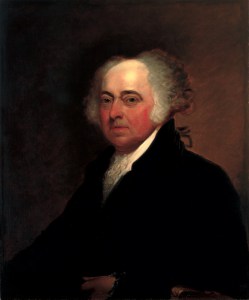On this day in history, John Adams wrote to Robert J. Evans explicating his views on slavery. Evans was a Philadelphia Quaker merchant who had written to a number of important politicians, including Adams, expressing his “conviction that the time has arrived, when some plan should be adopted for the eventual total extirpation of Slavery from the United States….”
Adams’ response to Evans included the following:
The turpitude, the inhumanity, the cruelty, and the infamy of the African commerce in slaves have been so impressively represented to the public by the highest powers of eloquence that nothing that I can say would increase the just odium in which it is and ought to be held. Every measure of prudence, therefore, ought to be assumed for the eventual total extirpation of slavery from the United States. If, however, humanity dictates the duty of adopting the most prudent measures for accomplishing so excellent a purpose, the same humanity requires that we should not inflict severer calamities on the objects of our commiseration than those which they at present endure, by reducing them to despair, or the necessity of robbery, plunder, assassination, and massacre, to preserve their lives, some provision for furnishing them employment, or some means of supplying them with the necessary comforts of life. The same humanity requires that we should not by any rash or violent measures expose the lives and property of those of our fellow-citizens who are so unfortunate as to be surrounded with these fellow-creatures by hereditary descent, or by any other means without their own fault. I have, through my whole life, held the practice of slavery in such abhorrence that I have never owned a Negro or any other slave, though I have lived for many years in times when the practice was not disgraceful, when the best men in my vicinity thought it not inconsistent with their character, and when it has cost me thousands of dollars for the labor and subsistence of free men, which I might have saved by the purchase of Negroes at times when they were very cheap. . . .”
I.e., yes, slavery is awful, but let’s not be rash! In any event, this letter was quite different in content and tone than the one that James Madison returned to Evans. Madison did own slaves, and used a number of excuses for maintaining the practice, even while professing distaste for it. As a book on African-Americans and Presidents explains:
Like Jefferson and Washington, Madison indicated that he was searching for an alternative means of income that would allow him and his family to continue to enjoy a wealthy and privileged lifestyle. Madison contended, as did Jefferson, that slavery was on the road to gradual extinction on its own. Left alone it would eventually die.”
Thus Madison had this to say to Evans in a letter on June 15, 1819:
To be equitable & satisfactory, the consent of both the Master & the slave should be obtained. That of the Master will require a provision in the plan for compensating a loss of what he held as property guarantied by the laws, and recognised by the Constitution. That of the slave, requires that his condition in a state of freedom, be preferable in his own estimation, to his actual one in a state of bondage.
To be consistent with existing and probably unalterable prejudices in the U. S. the freed blacks ought to be permanently removed beyond the region occupied by or allotted to a White population.”
Well, yes, because what slave would actually prefer freedom to bondage?
Madison’s heart may not have been in quite the same place as Adams’, but for slaves, Adams’ sympathy didn’t matter in any event; the outcome was the same.






Leave a comment